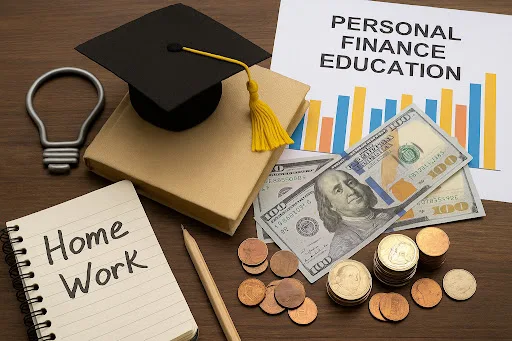- Schools often prioritize academic skills over practical financial knowledge.
- Financial struggles may stem from gaps in education, not personal failure.
- Money skills like budgeting and investing aren’t widely taught in school but are learnable.
- Your degree is not your destiny, it's a tool. Your skills drive wealth.
- You can close the gap by learning real-world finance skills now.
You learned to solve for X, but not how to value your time. You memorized the causes of World War I, but not how to budget for rent. Years of school gave you a certificate, but did it equip you to build a life?
You studied economics, yet struggle with taxes; read Shakespeare, yet can’t negotiate a salary.It’s not entirely your fault. School prioritized certain skills over others—some valuable, some less so for financial independence.
The real test isn’t algebra or literature—it’s managing rent, savings, taxes, and securing your freedom. And you were set up to fail. Why? Let’s explore why and how to bridge the gap.
Table of Contents
- What School Teaches (vs. What You Need)
- The Financial Impact of Traditional Education
- Psychological Barriers: Fear, Shame, and the Trap
- When School Isn’t Enough
- Why Schools Often Skip Wealth-Building Lessons
- Personal Audit: What Skills Are You Missing?
- The Unlearning Blueprint: Taking Control
- Common Misconceptions
- Start Your Financial Journey
- Tools & Resources to Build Financial Skills
- Glossary of Key Financial Concepts
WHAT SCHOOL TEACHES (VS WHAT YOU NEED)
School Teaches:
- Algebra, but rarely budgeting.
- Literature, but not persuasive communication.
- Biology, but not personal health or mental resilience.
- Following rules, but not calculated risk-taking.
You Need:
- How to budget and value your skills in the market.
- How to market yourself or a product online.
- How to negotiate, sell, and build confidence.
- How to invest, save, and grow wealth
"You may have aced exams but struggle to afford life’s basics. That’s not failure—it’s a gap in what you were taught."
THE FINANCIAL IMPACT OF TRADITIONAL EDUCATION
Many traditional education systems emphasize compliance over creativity, which can leave graduates unprepared for financial realities.
For example, Schools across the Globe teach students to:
- Follow instructions
- Fear mistakes
- Memorize, not Think.
The result? Young People who:
1. Don’t know their financial worth
2. Wait for permission to create
3. Feel shame about wanting wealth
4. Have Limited Practical Skills: Graduates often lack training in budgeting, taxes, or entrepreneurship.
5. Job Market Challenges: A 2021 UNESCO report estimated that 60% of youth in low-income countries lack basic employable skills.
6. Economic Consequences: In Nigeria, over 1.8 million graduates enter a job market annually with unemployment rates above 30% (National Bureau of Statistics, 2023).
In India, a 2022 study by Wheebox found 46% of graduates were deemed unemployable due to skill gaps.
What skill do you wish school had taught you to better manage your money?
PSYCHOLOGICAL BARRIERS: FEAR, SHAME, AND THE TRAP
Education systems can unintentionally reinforce mindsets that hinder financial growth:
1. Loss aversion: You avoid starting things because you fear failing.
2. Status quo bias: Believing a degree guarantees success, even when evidence suggests otherwise.
3. Shame Around Money: Guilt or cultural norms may make you feel like asking for fair pay or raising your price is greedy, prideful or naive.
> "School often rewards waiting for instructions. Wealth rewards taking initiative."
WHEN SCHOOL ISN’T ENOUGH
Tariq, Graduated top of his class, yet he was broke, confused, and ashamed. He Started a business but Without training in pricing, branding, or marketing, his small business failed.
He later realised he had to start taking lessons on business, entrepreneurship, etc. It took him longer to get started because he had to unlearn most things he'd spent 5 years studying. He’s now learning online and rebuilding.
Ayesha, A high school dropout, Ayesha started a thrift store on Instagram, learned e-commerce from YouTube, and now earns $600/month. No degree, no debt—just skills.
"School taught me to wait for permission. I learned to build without it."— Ayesha
WHY SCHOOLS OFTEN SKIP WEALTH-BUILDING LESSONS
Not all schools neglect financial education, but systemic factors contribute to the gap:
1. Historical Context: Many curricula, especially in the Global South, trace back to colonial systems designed to produce workers, not entrepreneurs (Source: “Education and Colonialism,” Journal of African Studies, 2020).
2. Outdated Frameworks: Syllabi often lag behind the digital economy, omitting skills like e-commerce or personal branding.
3. Cultural Norms: In some societies, discussing money is taboo, “greedy” or shameful, discouraging financial literacy.
4. Resource Constraints: Underfunded schools prioritize core academics over practical electives.
5. Fear-Based Learning: Mistakes punished, risk discouraged.
Which of these factors resonates with your experience?
PERSONAL AUDIT: WHAT SKILLS ARE YOU MISSING?
Take this quick checklist:
1. Can I create a monthly budget?
2. Do I understand taxes in my country?
3. Have I ever sold a product or service online?
4. Do I know the market value of my skills?
If you answered “no” to two or more, there’s a gap—but you can fill it.
THE UNLEARNING BLUEPRINT: TAKING CONTROL
1. Challenge Assumptions:
Grades don’t guarantee wealth; skills do.
2. Learn Money Basics:
Start with budgeting, saving, and investing (use apps like
YNAB).
3. Choose a Business Model:
Try selling a product, offering a service, or creating digital content.
4. Study Success:
Follow creators, entrepreneurs, on YouTube, TikTok, or X(Formerly Twitter) who share financial tips.
5. Start Small:
Sell a $5 or $10 product or service to build confidence.
6. Reflect on Beliefs:
What fears or doubts hold you back?
7. Join a Community:
Engage with global or local financial groups whether physically or digitally.
8. Set Boundaries:
Don’t let societal or family pressures undermine your goals.
Protect your mindset
9. Teach Others:
Share what you learn
Cement your growth by helping someone else
1. Good Grades Guarantee Wealth: Wealth follows skills, not scores. Skills like negotiation and adaptability often matter more (Harvard Business Review, 2021).
2. School Fully Prepares You For Life: It provides a foundation, but practical skills require self-learning.
3. Asking For Money Is Greedy: Valuing your work benefits you and your community.
4. Entrepreneurship Is Only For The Lucky Or Dropouts: It’s a learnable skill, built through practice.
"If school left you feeling unprepared, you’re not the problem—the system has gaps. You can fill them."
START YOUR FINANCIAL JOURNEY
School gave you tools, but not all the ones you need. You weren’t taught to build wealth because systems often prioritize stability over independence.
But you can rewrite your path.This Week, Take One Step:
- Try Selling a small product or service.
- Create a one-week budget.
- Share this with a friend.
Next Time: We’ll explore Cultural Beliefs That Keep You Broke and How to Break Free and Build Wealth on Your Terms (
Be the first to know!).
For now, ask yourself: What’s one belief from school that’s holding back your financial growth?
Affirmation: "I learn to earn. I build to thrive. I’m writing my own financial code."
Tools & Resources to Build Financial Skills
Glossary of Key Financial Concepts












Comments
Post a Comment
🤝 Hey friend, your voice matters—say hi or share your story below.